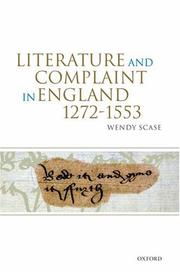| Listing 1 - 2 of 2 |
Sort by
|
Book
ISBN: 0252050231 9780252050237 0252041577 9780252041570 9780252083228 0252083229 Year: 2018 Publisher: Urbana Chicago
Abstract | Keywords | Export | Availability | Bookmark
 Loading...
Loading...Choose an application
- Reference Manager
- EndNote
- RefWorks (Direct export to RefWorks)
"Everyone has a complaint, but nobody likes a complainer. Rather than making things better a complaint can just make things worse. Often its only relief is the harmless and temporary release of steam. But it can also pose as criticism in one of several seemingly respectable forms. In Complaint, Avital Ronell looks at how complaints and complainers have been treated in literature and philosophy, in feedback loops that pay little attention to injustice and suffering. Beginning with Hamlet, and with open awareness of her own experiences, Ronell proceeds to show how complaining is aggravated, distracted, stifled, and transformed. She looks at exemplary complaints made by Friedrich Nietzsche, Hannah Arendt, and Barbara Johnson. She examines the complaint riven history of deconstruction. Renowned for her courage in taking on painful subjects with candor and wit, Ronell dares to listen to the haunting complaints of the dead"--
Social ethics. --- Complaints (Rhetoric) --- Literature, Modern --- Complaints (Rhetoric) in literature. --- Complaining (Rhetoric) --- Rhetoric --- Ethics --- Social problems --- Sociology --- Philosophy. --- History and criticism.

ISBN: 9780199270859 0199270856 9786611164447 1281164445 0191533785 9780191533785 9781281164445 6611164448 138304144X Year: 2007 Publisher: Oxford [etc.] Oxford University Press
Abstract | Keywords | Export | Availability | Bookmark
 Loading...
Loading...Choose an application
- Reference Manager
- EndNote
- RefWorks (Direct export to RefWorks)
Literature and Complaint in England 1272-1553 gives an entirely new and original perspective on the relations between early judicial process and the development of literature in England. Wendy Scase argues that texts ranging from political libels and pamphlets to laments of the unrequited lover constitute a literature shaped by the new and crucial role of complaint in the law courts. She describes how complaint took on central importance in the development of institutions such as Parliament and the common law in later medieval England, and argues that these developments shaped a literature of complaint within and beyond the judicial process. She traces the story of the literature of complaint from the earliest written bills and their links with early complaint poems in English, French, and Latin, through writings associated with political crises of the fourteenth and fifteenth centuries, to the libels and petitionary pamphlets of Reformation England. A final chapter, which includes analyses of works by Chaucer, Hoccleve, and related writers, proposes far-reaching revisions to current histories of the arts of composition in medieval England. Throughout, close attention is paid to the forms and language of complaint writing and to the emergence of an infrastructure for the production of plaint texts, and many images of plaints and petitions are included. The texts discussed include works by well-known authors as well as little-known libels and pamphlets from across the period.
Complaints (Rhetoric) --- English literature --- Law and literature --- Law in literature. --- Narration (Rhetoric) --- History and criticism. --- History --- Complaints (Rhetoric). --- Law in literature --- Complaining (Rhetoric) --- Literature and law --- History and criticism --- Rhetoric --- Literature --- Discourse analysis, Narrative --- Narratees (Rhetoric) --- Littérature anglaise --- Complaintes anglaises --- Réclamations (procédure administrative) --- 1100-1500 (moyen anglais) --- 16e siècle --- Histoire et critique --- Grande-Bretagne --- Moyen-Âge
| Listing 1 - 2 of 2 |
Sort by
|

 Search
Search Feedback
Feedback About UniCat
About UniCat  Help
Help News
News